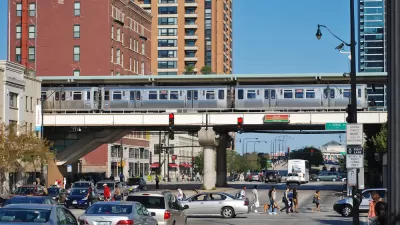The CTA just raised fares, but some think if the service were truly committed to equity it should be made free.

Jahmal Cole, founder of Chicago non-profit My Block, My Hood, My City told a recent planning panel on segregation in Chicago that he thought the CTA should be free. Cole thinks dropping the fare would give many Chicagoans who don't get to see the rest of the city access to careers, education, and cultural resources that they just can't access now. While the idea might sound utopian, it's an idea that's being proposed in other cities as well, Anne Hidalgo, Paris' mayor announced a study that could lead to free public transit in that city.
"Coaxing more people out of cars and onto buses and el trains would mean less congestion, pollution, and crashes, which would lead to less lost productivity and property damage, lower bills for public health and first responder services, and less wear and tear on roads," John Greenfield argues in the Chicago Reader. Still CTA representatives point out this plan is unlikely under current law. "State legislation that has been in place for 70 years requires the transit system to recoup half of its annual operating budget ($1.51 billion in 2018) from fare-box revenue," Greenfield reports. In fact, fares went up on January 7th of this year.
This doesn't mean the city couldn't subsidize fares for those with low incomes. "The Seattle-area transit authority currently offers the Orca Lift program, with $1.50 fares for residents earning less than 200 percent of the federal poverty level, similar to Chicago’s Divvy for Everyone discounted bike-share program," Greenfield writes.
FULL STORY: Should the CTA be free? Why not?

Planetizen Federal Action Tracker
A weekly monitor of how Trump’s orders and actions are impacting planners and planning in America.

San Francisco's School District Spent $105M To Build Affordable Housing for Teachers — And That's Just the Beginning
SFUSD joins a growing list of school districts using their land holdings to address housing affordability challenges faced by their own employees.

The Tiny, Adorable $7,000 Car Turning Japan Onto EVs
The single seat Mibot charges from a regular plug as quickly as an iPad, and is about half the price of an average EV.

Seattle's Plan for Adopting Driverless Cars
Equity, safety, accessibility and affordability are front of mind as the city prepares for robotaxis and other autonomous vehicles.

As Trump Phases Out FEMA, Is It Time to Flee the Floodplains?
With less federal funding available for disaster relief efforts, the need to relocate at-risk communities is more urgent than ever.

With Protected Lanes, 460% More People Commute by Bike
For those needing more ammo, more data proving what we already knew is here.
Urban Design for Planners 1: Software Tools
This six-course series explores essential urban design concepts using open source software and equips planners with the tools they need to participate fully in the urban design process.
Planning for Universal Design
Learn the tools for implementing Universal Design in planning regulations.
Smith Gee Studio
City of Charlotte
City of Camden Redevelopment Agency
City of Astoria
Transportation Research & Education Center (TREC) at Portland State University
US High Speed Rail Association
City of Camden Redevelopment Agency
Municipality of Princeton (NJ)



























